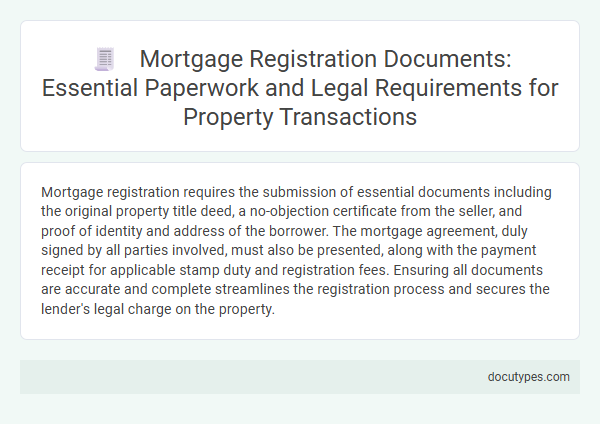Mortgage registration requires the submission of essential documents including the original property title deed, a no-objection certificate from the seller, and proof of identity and address of the borrower. The mortgage agreement, duly signed by all parties involved, must also be presented, along with the payment receipt for applicable stamp duty and registration fees. Ensuring all documents are accurate and complete streamlines the registration process and secures the lender's legal charge on the property.
Introduction to Mortgage Registration Documents
Mortgage registration is a crucial step in securing your property loan. It involves submitting specific documents to legally record the mortgage against the property.
Key documents typically include the sale deed, loan agreement, and identity proof. These documents validate ownership and confirm the terms of the mortgage agreement.
Importance of Proper Documentation in Property Transactions
| Document | Description | Importance |
|---|---|---|
| Sale Deed | Legal document proving the transfer of ownership from seller to buyer. | Establishes your legal right to the property and is required for mortgage registration. |
| Title Deed | Shows the history of ownership and confirms that the property is free from legal disputes. | Ensures clear ownership, reducing risk of future legal complications. |
| Encumbrance Certificate | Certificate indicating that the property is free from any monetary or legal liabilities. | Verifies that there are no outstanding loans or mortgages on the property. |
| Property Tax Receipts | Proof that property taxes have been paid up to date. | Demonstrates compliance with municipal regulations and strengthens credibility. |
| Identity Proof | Documents such as Passport, Aadhaar Card, or Driver's License. | Confirms the identity of parties involved and prevents fraud. |
| Address Proof | Utility bills, ration card, or bank statements showing current address. | Ensures proper communication and verification during registration. |
| Loan Sanction Letter | Document from the lender approving the mortgage loan. | Validates the loan amount and terms agreed upon for the mortgage. |
| Khata Certificate and Extract | Official document containing property details and ownership in municipal records. | Required for local property registration and tax purposes. |
| Agreement to Sale | Preliminary agreement between buyer and seller outlining terms of sale. | Outlines the transaction details before the final sale deed is executed. |
Proper documentation is crucial in property transactions. Ensuring that all required documents are accurate and complete protects you from legal complications and facilitates a smooth mortgage registration process. Accurate paperwork enhances trust between parties and supports clear ownership records.
Key Legal Requirements for Mortgage Registration
What documents are required for mortgage registration? Essential documents include the original title deed, a duly filled mortgage application form, and the loan sanction letter from the lending institution. Legal identity proof and property tax receipts are also mandatory for completing the mortgage registration process.
Primary Mortgage Registration Forms and Their Purpose
Mortgage registration requires specific documents to ensure legal validation and protection of interests. Knowing the primary mortgage registration forms and their purposes can streamline the process.
- Mortgage Deed - This form outlines the terms and conditions of the mortgage agreement between the borrower and lender.
- Loan Agreement - It details the loan amount, repayment schedule, and interest rates associated with the mortgage.
- Property Title Document - This verifies ownership and ensures the property can legally be mortgaged.
Your careful submission of these documents is essential for successful mortgage registration and securing your property rights.
Property Title Deeds and Verification Processes
Mortgage registration requires specific documents to ensure legal ownership and proper lien recording. The most critical among these are the property title deeds, which serve as proof of ownership and legal entitlement.
Verification processes involve confirming the authenticity of the title deeds through land registry checks and title search reports. Additional documents may include identity proofs of the borrower, sale agreement, and no-objection certificates from relevant authorities. Accurate documentation prevents disputes and facilitates smooth mortgage processing.
Role of the Mortgage Deed in Property Transfers
Mortgage registration requires key documents including the mortgage deed, property title, and identification proofs. The mortgage deed plays a vital role in property transfers by legally recording the lender's interest in the property. It ensures clear ownership rights and facilitates a smooth transfer process between borrower and lender.
Stamp Duty and Registration Fees Explained
Mortgage registration requires specific documents to comply with legal and financial regulations. Understanding stamp duty and registration fees is essential for accurate budgeting during this process.
- Stamp Duty - A government-imposed tax based on the property's value that must be paid before registration.
- Registration Fees - Charges levied by the registry office for recording the mortgage, varying by jurisdiction and property type.
- Essential Documents - Includes the sale deed, identity proof, property tax receipts, and the completed mortgage application form.
Government Regulatory Compliance in Mortgage Registration
Mortgage registration requires compliance with specific government regulations to ensure legal recognition and protection of lender and borrower rights. Proper documentation is essential to meet these regulatory standards and facilitate smooth processing at the registration office.
- Title Deed - A clear and marketable title deed is required to prove ownership of the property being mortgaged.
- Mortgage Agreement - This legally binding document outlines the terms and conditions agreed upon by the borrower and lender.
- Government Sanctioned ID Proof - Valid identification documents are mandatory for both parties to verify identities and prevent fraud.
Common Mistakes to Avoid in Mortgage Paperwork
Mortgage registration requires essential documents such as the sale deed, identity proof, property tax receipts, and encumbrance certificate. Common mistakes include submitting incomplete or outdated documents, incorrect property details, and failure to sign all required forms. Ensuring accuracy and completeness helps avoid delays and legal complications during the mortgage registration process.
What Documents Are Required for Mortgage Registration? Infographic

